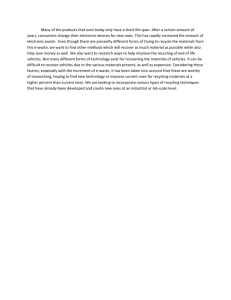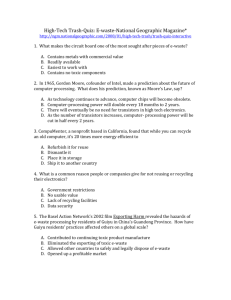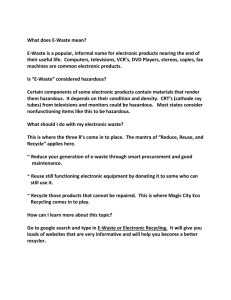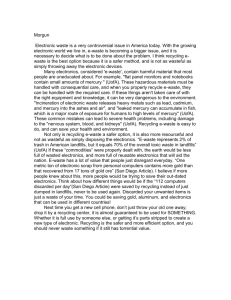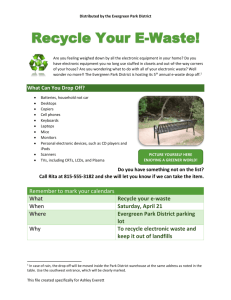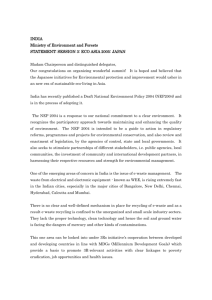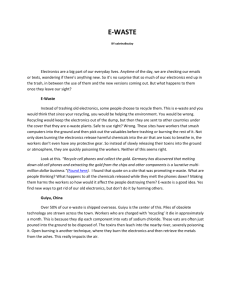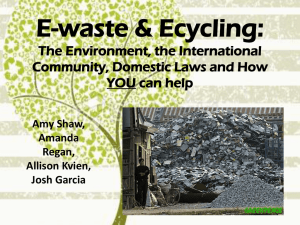Electronic Waste
advertisement
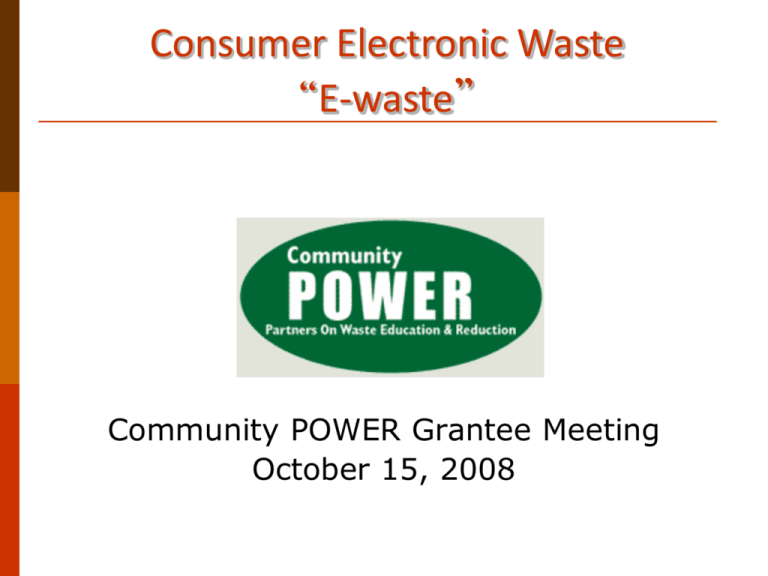
Consumer Electronic Waste “E-waste” Community POWER Grantee Meeting October 15, 2008 Presentation Outline 1. The Problem • What is e-waste? • Environmental concerns • Trends driving growth 2. Minnesota Solutions • Minnesota Electronics Recycling Act 3. How Can You Help? • Raise awareness • Promote recycling opportunities What is E-waste? Any waste that has a circuit board or cathode ray tube (CRT) Minnesota’s definition includes: Televisions Computers: central processing units (CPUs), monitors, laptops Computer keyboards, speakers, printers, and other peripherals VCRs and DVD players Fax machines …from HOUSEHOLDS What are the Environmental Concerns? Key contaminants: Lead in CRTs & circuit boards Cadmium in contacts & switches Brominated flame retardants in plastics Hazards to human health and the environment if improperly managed. Growth of E-waste: Technology Trends Technological advances speed up obsolescence & lead to more e-waste PC lifespan falling to estimated 2 years Improved TVs/monitors: HD, LCD, plasma Digital television transition set for Feb. 17, 2009 Growth of E-waste: Digital Television Transition If you use “rabbit ears” or rooftop antenna with an analog TV, you must act. Options: Buy a converter box to plug into your TV Connect your analog TV to cable, satellite or other pay service Buy a TV with a digital tuner For more information, see: www.dtv.gov www.dtvtransition.org www.dtvanswers.com www.getreadyfordigitaltv.com Minnesota Solutions Minnesota Solution: CRT Disposal Ban 2003 Session: Prohibition passes Effective July 1, 2005, a person may not place in mixed municipal solid waste an electronic product containing a cathoderay tube. Minn. Statute 115A.9565 Minnesota Solution: Electronics Recycling Act Passed in the 2007 Session Began July 1, 2007 Manufacturer Responsibility based on sales weight Not based on return share or consumer fees on products as in other states Requires registration and reporting by all parties involved Manufacturers, Collectors, Recyclers and Retailers What Can You Do? Raise Awareness Promote Recycling Opportunities E-Waste Tool Kit SWMCB developed a tool kit to help municipalities, counties, and other entities promote e-waste recycling to residents. Tool kit includes: 8 images 3 advertisement templates 2 utility bill insert templates 4 articles Top 10 Facts and Top Questions from Residents SWMCB’s Key Messages & Strategies 1. Easy & convenient Many recycling locations in the Twin Cities Find sites at GreenGuardian.com Key Messages & Strategies 2. De-clutter Motivate people to “get rid of, clean out” Key Messages & Strategies 3. Use trigger events Holidays, Super Bowl, back-to-school What are the Tools? Advertising Templates What are the tools? Free Images to Download What are the tools? Fact sheets & Articles Terminology Top 10 Facts Top Questions from Residents “Recycle Your Electronics” “Clean out Your Clutter” “The Super Bowl…” Web articles Where can households recycle e-waste? Lists of collection sites are available at: Minnesota Pollution Control Agency www.pca.state.mn.us/electronics Solid Waste Management Coordinating Board www.greenguardian.com Hennepin County Environmental Services www.hennepin.us keyword search: a to z. Click on “electronics.” What to do before you recycle… Identity and other personal information can be stolen from a computer, cell phone, or other data storage devices. Before recycling your electronics, protect yourself from identity theft by removing personal data and your files. For information on how to remove data, check with the manufacturer, the recycler, or search the Internet. Comments & Questions? Amy Roering Hennepin County (612) 348-8992 amy.roering@co.hennepin.mn.us www.hennepin.us
